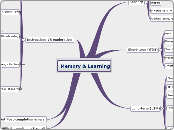Memory & Learning
Sensory
Iconic
sparkler (0.5 seconds)
Echoic
Location of sound, playsback to work out
Haptic
Filtered to STM by attention
Cocktail party effect, hear your name, choose to attend
Short-term (STM)
eg when calculating basic maths or reading a sentence
Decays repidly
7+- 2 items of information (Miller)
Chunk
Recency effect
Interference only occurs when tasks utilize the same channel
Long-term (LTM)
Slow access time, unlimited capacity, slow decay
Episodic
Stories, events, about things
Semantic
Knowing that. e.g. facts, concepts. Semantic network of connections (neurons)
Procedural
Knowing how. e.g. to ride a bike. Learning of motor and cognitive skills
Hard to explain, mostly unconcious
3 related activities
Remembering / storing
repitition, meaningful,
Forgetting
decay & interference. We never lose it, just hard to retrieve
Retrieving
recall & recognition
Instructions VS exploration
Carroll / instructions
Word processing. manual vs cards relating to tasksGrp 2 quicker to learn, complete & more successful at completing tasks
Rieman, 1996
Like to try it out based on past experiences & current mental model, prefer explore
dont read a manual
just in time, task dependent
Problem solving, fun
Disadvantages
Can learn non-ideal methods that are slower
May forget how a goal was accomplished
reflection can help
APPLIED: Encourage Exploration
progressive disclosure, reveal feature incrementally
Well labelled, well organised menus, UNDO
Context /goal specific help
Requires they can guess. LINK TO MENTAL MODELS
cost/benefit analysis whether to procede
other ways of learning
Manual, training, online help, friends/colleagues
Post-completion errors
e.g sending email w/ no attachment
Recognition VS recall
Command Based vs GUI
